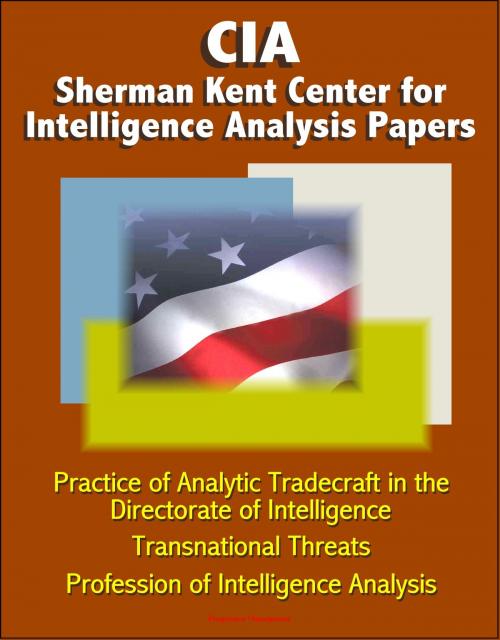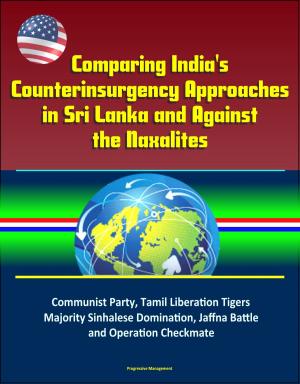CIA Sherman Kent Center for Intelligence Analysis Papers: Practice of Analytic Tradecraft in the Directorate of Intelligence, Transnational Threats, Profession of Intelligence Analysis
Nonfiction, Social & Cultural Studies, Political Science| Author: | Progressive Management | ISBN: | 9781301058518 |
| Publisher: | Progressive Management | Publication: | August 24, 2013 |
| Imprint: | Smashwords Edition | Language: | English |
| Author: | Progressive Management |
| ISBN: | 9781301058518 |
| Publisher: | Progressive Management |
| Publication: | August 24, 2013 |
| Imprint: | Smashwords Edition |
| Language: | English |
This publication of the Central Intelligence Agency (CIA) is intended to help the Kent Center fulfill its mission of promoting the practice of analytic tradecraft in the Directorate of Intelligence, and of furthering a greater understanding of intelligence analysis in the wider communities in which it is practiced, studied, or taught. These unclassified Occasional Papers are disseminated externally, as appropriate, in addition to being used in courses at the Sherman Kent School, CIA University, and elsewhere in the Intelligence Community.
The Kent Center is confident that intelligence analysts now and in the future will benefit from the lessons and insights that contributors to Occasional Papers provide. It is hoped that they will prove to be a valuable addition to the practical literature on intelligence analysis.
Contents: Volume 1, Number 1: Improving CIA Analytic Performance: Strategic Warning * Volume 1, Number 2: Improving CIA Analytic Performance: Analysts and the Policymaking Process * Volume 1, Number 3: Improving CIA Analytic Performance: DI Analytic Priorities * Volume 1, Number 4: When Everything Is Intelligence - Nothing Is Intelligence * Volume 1, Number 5: Sherman Kent and the Profession of Intelligence Analysis * Volume 2, Number 1: Strategic Warning: If Surprise is Inevitable, What Role for Analysis? * Volume 2, Number 2: Tensions in Analyst-Policymaker Relations: Opinions, Facts, and Evidence * Volume 2, Number 3: Sherman Kent's Final Thoughts on Analyst-Policymaker Relations * Volume 3, Number 1: Making Sense of Transnational Threats * Volume 3, Number 2: Rethinking "Alternative Analysis" to Address Transnational Threats.
Sample: Analytic Tradecraft for Managing Substantive Uncertainty - The failure to provide strategic warning during the months prior to Iraq's 1990 invasion of Kuwait generated recommendations for revamping warning analysis by DDI Doug MacEachin (1993-1995) that spurred changes in the DI's analytic approach to substantive uncertainty generally. The DDI observed that the bottom-line judgment that Iraq was unlikely to initiate warfare in the near term, issued repeatedly in the year before the assault on Kuwait, was based on the assumption that Iraq needed several years to recover from the military and economic devastation of its long war with Iran. That assumption was so widely held by analysts that it was rarely examined critically. Nor was the heavy dependence of the no-war conclusion on the recovery-first assumption explicitly recognized.
This publication of the Central Intelligence Agency (CIA) is intended to help the Kent Center fulfill its mission of promoting the practice of analytic tradecraft in the Directorate of Intelligence, and of furthering a greater understanding of intelligence analysis in the wider communities in which it is practiced, studied, or taught. These unclassified Occasional Papers are disseminated externally, as appropriate, in addition to being used in courses at the Sherman Kent School, CIA University, and elsewhere in the Intelligence Community.
The Kent Center is confident that intelligence analysts now and in the future will benefit from the lessons and insights that contributors to Occasional Papers provide. It is hoped that they will prove to be a valuable addition to the practical literature on intelligence analysis.
Contents: Volume 1, Number 1: Improving CIA Analytic Performance: Strategic Warning * Volume 1, Number 2: Improving CIA Analytic Performance: Analysts and the Policymaking Process * Volume 1, Number 3: Improving CIA Analytic Performance: DI Analytic Priorities * Volume 1, Number 4: When Everything Is Intelligence - Nothing Is Intelligence * Volume 1, Number 5: Sherman Kent and the Profession of Intelligence Analysis * Volume 2, Number 1: Strategic Warning: If Surprise is Inevitable, What Role for Analysis? * Volume 2, Number 2: Tensions in Analyst-Policymaker Relations: Opinions, Facts, and Evidence * Volume 2, Number 3: Sherman Kent's Final Thoughts on Analyst-Policymaker Relations * Volume 3, Number 1: Making Sense of Transnational Threats * Volume 3, Number 2: Rethinking "Alternative Analysis" to Address Transnational Threats.
Sample: Analytic Tradecraft for Managing Substantive Uncertainty - The failure to provide strategic warning during the months prior to Iraq's 1990 invasion of Kuwait generated recommendations for revamping warning analysis by DDI Doug MacEachin (1993-1995) that spurred changes in the DI's analytic approach to substantive uncertainty generally. The DDI observed that the bottom-line judgment that Iraq was unlikely to initiate warfare in the near term, issued repeatedly in the year before the assault on Kuwait, was based on the assumption that Iraq needed several years to recover from the military and economic devastation of its long war with Iran. That assumption was so widely held by analysts that it was rarely examined critically. Nor was the heavy dependence of the no-war conclusion on the recovery-first assumption explicitly recognized.















